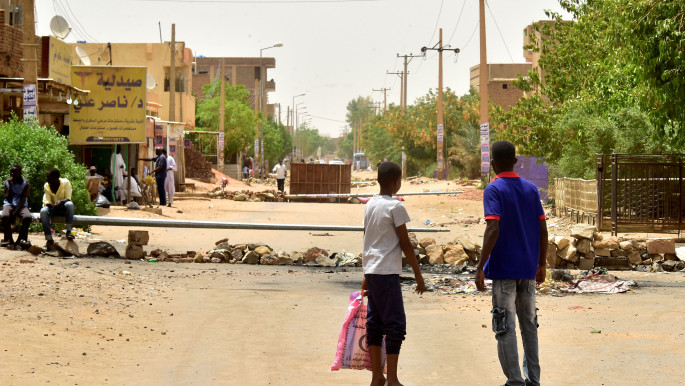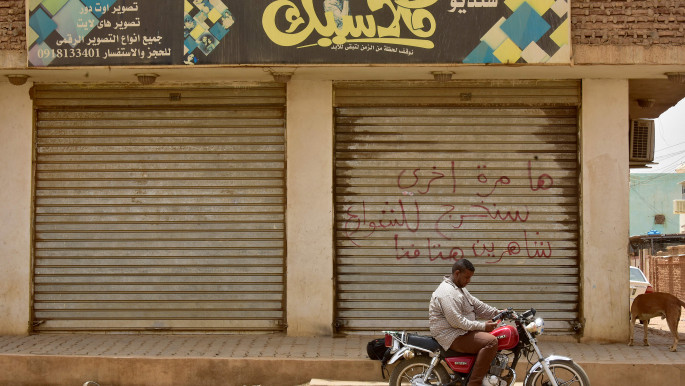Sudan protesters face violence, arrests as 'total' civil disobedience campaign begins
Paramilitary and security forces stormed a thousands-strong sit-in in the capital Khartoum on Monday, beating and shooting live ammunition at unarmed protesters and allegedly throwing tens of dead bodies into the river Nile.
Reports of rape and looting have also been widespread in the ongoing crackdown, during which at least 118 people have been killed according to the Central Committee for Sudanese Doctors (CCSD).
In the immediate wake of the sit-in massacre, leading protest organisers the Sudanese Professionals Association (SPA) called for a "total" civil disobedience campaign, including a comprehensive general strike.
'Janjaweed' roam the streets
The campaign began on Sunday morning as eyewitnesses reported empty streets and shuttered businesses throughout the capital and other towns and cities, although most Khartoum residents have remained indoors since Monday.
The campaign was proceeded by the arrests of two rebels and an opposition leader.
The SPA also claimed that workers in "vital sectors", including electricity, banking and aviation, had been arrested and intimidated in the run-up to the strike.
 |
| Barricades in a Khartoum neighbourhood [AFP] |
Protesters built roadblocks across Khartoum in an attempt to secure neighbourhoods from the paramilitary militias and security forces.
Previous roadblocks were a target of threats from the military junta and were then dismantled as part of the bloody crackdown.
|
|
"Almost all internal roads of [northern Khartoum neighbourhood] Bahari have roadblocks," a witness told AFP. "Protesters are even stopping residents from going to work."
But police on Sunday targeted the demonstrators, firing gunshots in the air and tear gas at the protesters before clearing the barricades, the eyewitness said.
The paramilitary Rapid Support Forces (RSF), commanded by the military junta's deputy leader, has been accused of being the main perpetrator for the sit-in massacre and ongoing violence.
The RSF is an officialised offshoot of the Janjaweed militias accused of war crimes and crimes against humanity in the Darfur conflict. It has also allegedly committed widespread human rights abuses against migrants and ethnic minorities in Sudan's southern conflict zones.
RSF forces were seen moving across the capital in armed vehicles, eyewitnesses said.
They had also surrounded the main electricity station.
In a previous general strike almost two weeks ago, activists reported electricity workers in Khartoum were beaten and forced at gunpoint to continue working.
Similar events were reported at Sudan's central bank.
RSF forces were also attempting to find and arrest prominent opposition activists, social media activists said on Sunday.
Three people were killed on Sunday, according to the CCSD.
Two of them died in hospital after being "beaten and stabbed" by "Janjaweed militias" in Khartoum.
Another, 20-year-old protester Ayman Osama, was killed by a "direct gunshot to the chest" by the "Janjaweed militia".
The CCSD added that a number of other people were being treated for unspecified injuries sustained over the course of the day.
 |
| A shuttered store pledging protests at a later date [AFP] |
Flights 'grounded', hospitals closed
Unconfirmed reports allege that the military junta had imported aviation workers from Egypt to keep the Khartoum airport running. While activists on Sunday said flights had been grounded by the campaign, state news agency SUNA claimed the airport was running normally.
The paramilitary forces had also forced the complete closure of eight Khartoum public hospitals and the partial closure of three more, the CCSD said.
The main causes of the hospital closures, activists said, were harassment of doctors and storming of hospitals earlier in the week, and the lack of vital medicines.
The National Fund for Medical Supplies had earlier this week been broken into and looted in the "wildest and barbaric of manners", the Central Committee of Sudanese Pharmacists said on Sunday.
Other hospitals in the capital remain open, Elbagir reported.
The CCSD said on Friday it would be engaging in a "medical disobedience" campaign not by striking but by providing emergency care for free in order to prevent medical fees going into the military's coffers.
Eyewitnesses in Omdurman reported that some businesses remained open and that roadblocks had been removed in some locations by troops.
Residents in Al-Obeid and Madani told AFP that markets and bakeries were closed.
The brother of a leading SPA opposition activist, Dr Mohammad Naji al-Asam, said his brother's social media accounts were hacked in an attempt to prevent the disobedience campaign. Social media activists claimed other leading opposition figures had been hacked.



